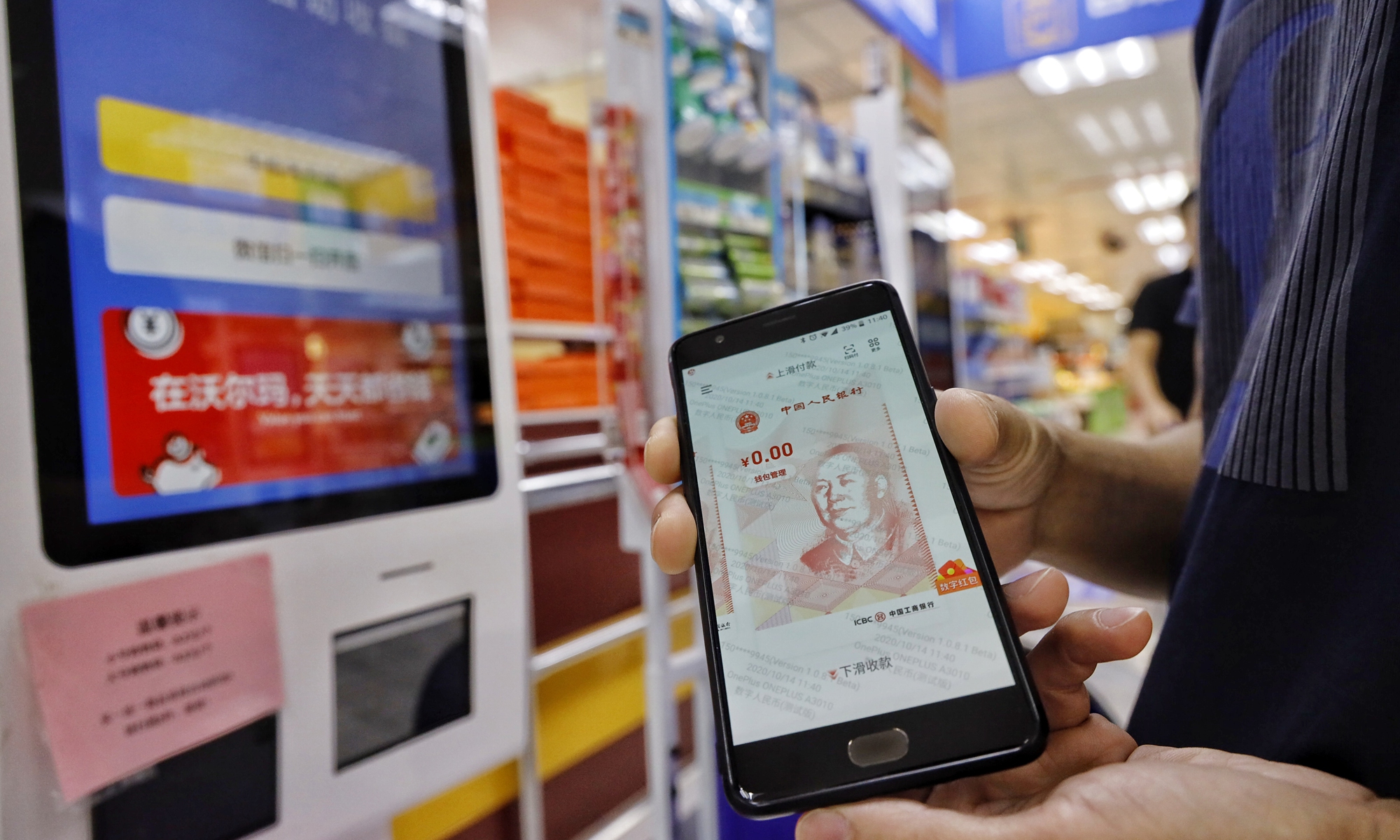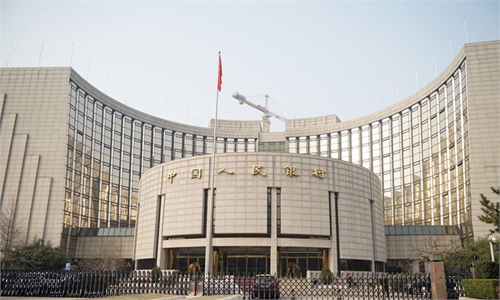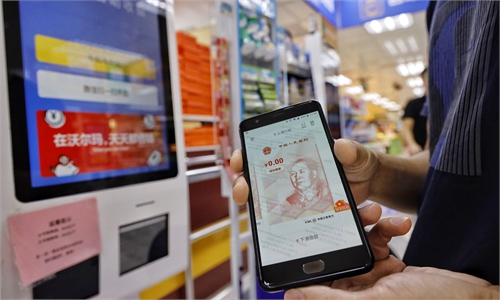China to usher in a new digital renminbi era in 2021
E-currency will prevent forgery, improve traceability and security

Residents who received "red packets" of digital RMB use the money in stores in Shenzhen, Guangdong Province, on Wednesday. The city launched a pilot program to distribute 10m yuan ($1.49m) in the form of digital currency to residents on Monday.Photo:Li Hao/GT
China announced Saturday it will launch a second public test of its digital currency in the form of "red packets" - consumption coupons. Analysts say the new round of tests involve a wider range of consumer and application scenarios compared to the first public trial. The pilot scheme has already been successfully rolled-out across several provinces as China will usher in a new area of digital currency.
Suzhou, in East China's Jiangsu Province plans to issue 100,000 digital yuan red packets worth 20 million yuan ($3.06 million) in total, each containing 200 yuan, to local residents.
Ongoing pilot programs have been running across five Chinese cities, including Shenzhen, South China's Guangdong Province, Suzhou, Chengdu in Southwest China's Sichuan Province and Xiong'an New Area near Beijing. It is also reportedly in trial test in areas where the 2022 Winter Olympics Games will be held.
In mid-October, when China publicly tested the digital yuan in Shenzhen, the local government and China's central bank jointly gave away 50,000 digital red packets each containing 200 yuan. It was the first time that the digital currency was tested in a public setting.
The Suzhou program is unique in the adding online payment in addition to various offline applications. Red packets can be used on JD.com. Suzhou residents in designated part of the city can order and pay for products on the JD.com platform without leaving their home.
China's digital economy has entered a period of rapid advancement. Research and development (R&D) and applications for a digital yuan will be conducive to improving connectivity between individuals and enterprises in the digital economy, while boosting economic growth, said an analyst.
The Hong Kong Monetary Authority (HKMA) and People's Bank of China, the Central Bank, are planning a technical pilot testing of digital yuan. While the exact launch schedule is unknown, it will offer an additional payment option, said Eddie Yue, chief executive of HKMA on Friday.
"As the yuan is already in use in Hong Kong and the status of digital yuan is equivalent to all other forms of legal tender, it will deliver even greater convenience to Hong Kong residents and tourists from the Chinese mainland," said Yue.
Prior to Yue's remarks, Hong Kong Financial Secretary Paul Chan Mo-po said in November that if the digital yuan could be applied in cross-border payment, it would further promote the connectivity between the Hong Kong Special Administrative Region and the Chinese mainland, especially the Guangdong-Hong Kong-Macao Greater Bay Area.
Central bank governor Yi Gang also said on Monday that China will push forward the R&D of the Central Bank-backed sovereign digital currency in a steady manner, launch pilot tests in an orderly manner and improve the legal framework for digital yuan.
The year 2021 will usher in an important dividend period of digital industry. After several years of development, the technologies have become more mature, according to Pan Helin, executive director of the Digital Economy Research Institute at the Zhongnan University of Economics and Law.
"In recent years, China's digital industry has boomed, and new technologies such as big data, cloud computing, 5G, artificial intelligence and blockchain have been rapidly developed and widely applied in various fields of social economy, laying a good foundation for the development and application of digital currency," Pan told the Global Times.
Seventeen years after the second amendment of the Law of the People's Republic of China on the People's Bank of China was approved, public comments are also being taken on a new draft version that was proposed in October, which could potentially legalize digital yuan, paving the way for its popularization in China.
Once passed, the new draft would enable the PBC, China's central bank to coordinate supervision over important financial institutions, financial holding companies and important financial infrastructure, as well as to increase penalties for violations.
"The new law is an attempt to guard against systemic financial risks amid the two-way opening of China's market and the huge scale of financial products innovation," Dong Dengxin, director of the Finance and Securities Institute at the Wuhan University of Science and Technology, told the Global Times.
"It will play a vital part in financial supervision. It will guard against forgery and money laundering, as it is highly traceable. It will also cut the cost of issuing, recycling and transporting cash," Dong said.
Guo Tianyong, head of the Chinese Banking Industry Research Center at the Central University of Finance and Economics in Beijing, told the Global Times that usage of digital yuan through online payments can achieve "point-to-point" transactions. Payments won't have to go through WeChat or Alipay but instead through another system backed by the PBC, and help reduce risks, said Guo.



